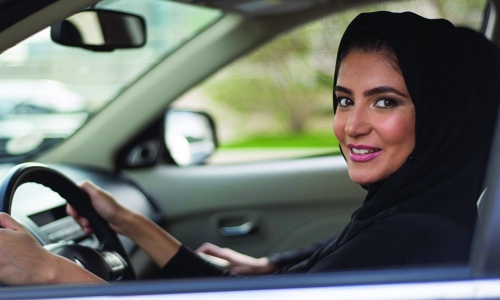Uber, Careem recruit female drivers in Saudi
Dubai : Ride hailing applications in Saudi Arabia are recruiting female drivers, after the Kingdom announced plans to lift the ban on women driving by June 2018.
Female customers currently represent 80% of Uber’s Saudi rider base and 70% of business for its Dubai-based counterpart, Careem, according to statistics shared with CNN by both companies. The apps are a lifeline to women with no independent way to get around the Kingdom.
Currently, all drivers employed by the two firms are male -- mostly Saudi nationals driving their privately-owned vehicles.
Following the ground-breaking royal decree that announced plans to lift the ban on women driving last September, however, both companies have been preparing to hire their first female drivers.
Hundreds of women already certified
After the decree was issued, the company launched a series of 90-minute training sessions, in the Saudi cities of Riyadh, Jeddah and Al Khobar, targeting Saudi women who have already acquired valid driving licenses while abroad.
Careem operates in 13 countries across the Middle East, North Africa, and Pakistan and is valued at around $1 billion.
Taught by existing female Saudi employees of Careem (working in administration roles, not as drivers), the sessions educate attendees about Saudi road laws, customer service techniques, and how to use the application’s platform.
“From the first moment, we announced our willingness to welcome the ladies to work on our platform,” says Abdullah Elyas, co-founder and chief privacy officer at Careem, over email.
Careem has already received thousands of applications from Saudi women interested in becoming drivers, Elyas says. Those who complete the training sessions receive a certificate which acts as a guarantee that they have officially joined Careem’s team, bar any changes to Saudi traffic laws, says Careem’s public relations manager, Murtadha Alalawi.
Uber, meanwhile, has announced plans to open “one-stop-shop” facilities dedicated to recruiting future female drivers, or “partners”, as the company calls them. These Green Light Hubs already exist in the country to serve male employees.
“We will partner up with necessary stakeholders to facilitate the paperwork, training access, and access to vehicles, including access to driving schools run by third party partners,” says Zeid Hreish, Uber’s general manager in Saudi Arabia.
Hreish adds that Uber has also launched “listening sessions” for women in Riyadh, which have been attended by a number of influential figures including the company’s CEO Dara Khosrowshahi. The sessions are aimed at “shaping the company’s priorities and upcoming plans for women in the Kingdom,” and have addressed topics such as problems women could face when driving.
At least 10,000 female drivers by June
Careem plans to hire more than 10,000 “female captains” -- drivers -- by June 2018, says Elyas.
“Female captains will help us provide a better service to many women who want to travel but refuse to be driven by men,” he says. Many women from conservative backgrounds currently do not use ride hailing apps, as being driven by an unknown male is unacceptable in their culture.
“This means that a new segment of Saudi society that does not use our services will begin (to use it) next
June.”
“The first thing that made me think about working for Careem was our great need to drive,” says Alawwami. “As women in Saudi, we need a man for our smallest commuting needs, and the local taxi service is not sufficiently available where I live.”
Alawwami got her driving license while studying in the United Arab Emirates.
“Ride hailing applications have helped us a lot,” she says. “I want to be there to help when someone is in need of a lift, and it is a beautiful feeling to be among the first female captains in my country.”
The mother-of-one says that her husband and family never opposed women being allowed to drive. She believes that “the announcement of the government’s plan to lift the ban has caused many of those who said they opposed females driving to become supportive of it overnight.”
Related Posts

